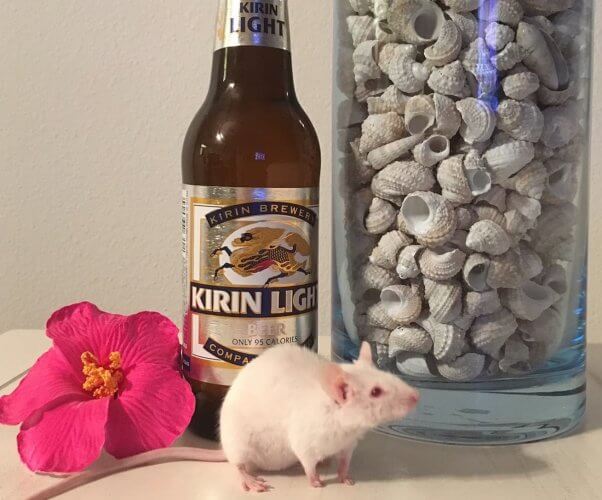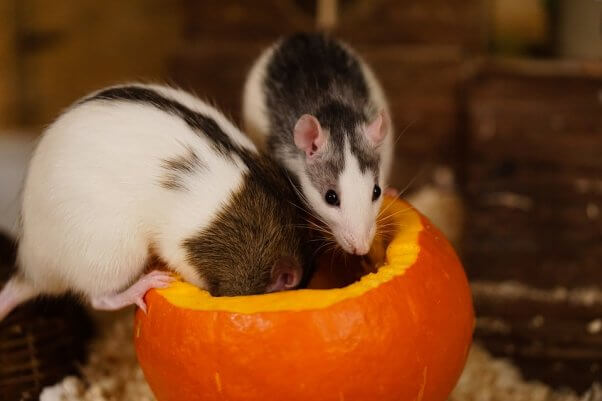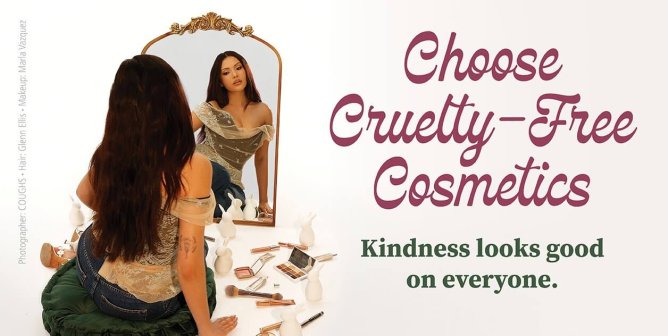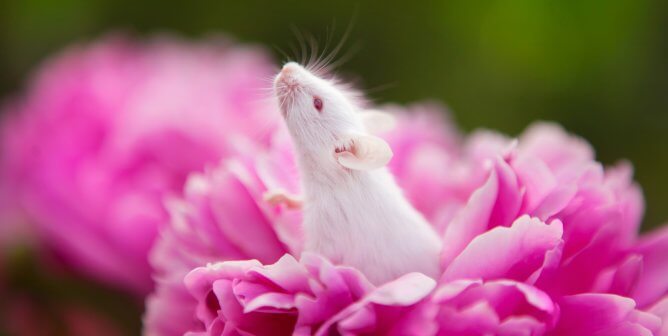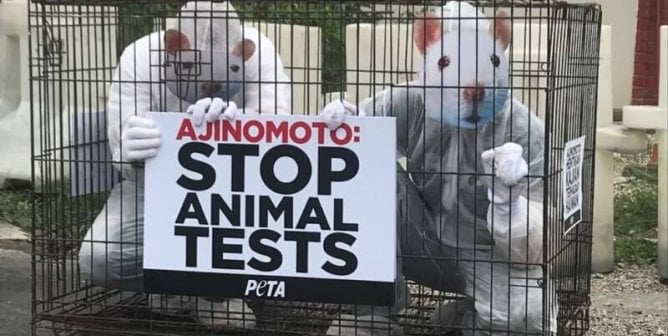Victory! Global Food Industry Ditches Deadly Animal Tests—See the List
PETA scientists are modernizing food-industry testing worldwide by successfully persuading companies to use modern science and end the use of cruel and deadly animal tests.
Following extensive discussions, PETA persuaded the food and beverage companies marked with an asterisk (*) below to stop conducting or funding deadly experiments on animals in order to establish health claims for the marketing of products or ingredients. Now, they’ll no longer take part in animal tests unless they’re required by law or government regulators (and PETA is working on that, too). These victories will prevent thousands of animals in laboratories from being poisoned, electrocuted, cut apart, and much more. All the other companies listed below have never tested on animals and have confirmed to us that they have no intention of starting.
Food and Beverage Companies That Don’t Test on Animals
- Accolade Wines
- Adagio Teas
- Agropur Dairy Cooperative
- AGV Products Corp.*
- Alfred Ritter GmbH & Co. KG
- Amy’s Kitchen, Inc.
- Ankerkraut GmbH
- Apeejay Surrendra Group (Typhoo Tea only)
- Arbor Crest Wineries & Nursery, Inc.
- Arcor S.A.I.C.
- Asahi Group Holdings, Ltd.*
- Australian Fruit Tea Company Pty Ltd.
- B&G Foods, Inc.
- Bacardi-Martini, Inc.
- Ball Corporation*
- Barilla SpA*
- Barry Callebaut*
- Bettys & Taylors of Harrogate Ltd.
- Beyond Meat
- Bigelow Tea
- Bimbo Bakeries USA
- Black Star Farms, LLC.
- Blommer Chocolate Company*
- Bombay Cheese Company
- Bonduelle Group
- Borealis Foods
- Brown-Forman Corporation
- Calicutts Spice Co.
- Califia Farms
- Campbell Soup Company
- Catalyst Food
- Chobani Global Holdings, LLC
- The Coca-Cola Company*
- Cocojune Products
- Constellation Brands, Inc.*
- Daintree Tea
- Dean Foods
- Del Monte Pacific, Ltd.
- Diaspora Tea & Herb Co (doing business as Rishi Tea & Botanicals)
- Dole Food Company*
- Don Lee Farms (Goodman Food Products, Inc.)
- Praeger’s Sensible Foods
- E. & J. Gallo Winery
- Eclipse Foods
- Ensuiko Sugar Refining Co., Ltd.*
- Ethicoco
- Ezaki Glico Co., Ltd.*
- Field Roast
- Flowers Foods, Inc.
- Follow Your Heart
- Fortnum & Mason
- The Frauxmagerie Ltd.
- Fuji Oil Holdings Inc.*
- Gathered Foods
- General Mills Inc.*
- Givaudan
- Grape King Bio*
- Green Monday Group/OmniFoods
- Grupo Peñaflor S.A.
- Hain Celestial Group
- The Happy Calf
- Hari Har Chai
- Heineken N.V.
- The Hershey Company*
- Hooray Foods
- HOT EARTH GmbH
- House Foods Group Inc.*
- Ingredion Incorporated*
- Intelligentsia Coffee, Inc.
- J&J Snack Foods Corp.
- James White Drinks
- JINKA Foods
- Kellogg Company*
- Keurig Dr Pepper Inc.
- Kewpie Corporation*
- Kikkoman Corporation*
- KIND
- Kipster
- Kirin Holdings Co., Ltd.*
- Koala Tea Company Pty Ltd.
- Korea Yakult*
- Kuleana
- Lactalis American Group, Inc.
- Lakewood Organic Juices
- Lancaster Colony Corporation
- Lian Hwa Foods Corp.*
- Lightlife Foods, Inc.
- Lindt & Sprüngli
- Lovebiotics
- May Wah with Lily’s Vegan Pantry
- McCain Foods Limited*
- McCormick & Company, Inc.
- Megmilk Snow Brand Co., Ltd.*
- Meiji Co., Ltd.*
- Microbio Co.*
- Mitch’s Vegan Jerky
- Modernist Pantry
- Molson Coors Brewing Company
- Monde Nissin
- Monogram Foods Solutions, LLC
- Morinaga & Co., Ltd.*
- Nagase & Co., Ltd.*
- Next Gen Foods
- NH Foods Ltd.*
- Nippon Suisan Kaisha, Ltd.*
- Nissin Foods Holdings Co., Ltd.*
- Nitto Beverage Co., Ltd.
- Nuts For Cheese
- Oatly Group
- Ocean Spray Cranberries, Inc.*
- The Original Ceylon Tea Company
- OSI Group
- Ostfriesische Tee Gesellschaft GmbH & Co. KG
- Paap Mukt
- PepsiCo, Inc.*
- Pernod Ricard*
- Pilk India
- Pinnacle Foods Inc.
- Plantmade
- POM Wonderful LLC*
- Primeval Foods
- Primo Water Corporation
- Rebellyous Foods
- Reily Foods Company
- Reine Vegan Cuisine
- Rich Products Corporation
- Riken Vitamin Co., Ltd.*
- Robertet SA*
- Sanderson Farms, Inc.
- Sapporo Holdings Ltd.*
- Saputo Inc.
- Satake Corporation*
- Semper AB
- Seneca Foods Corporation
- Sensient Technologies Corporation*
- Shaka Harry Store
- Shiok Meats Pte. Ltd.
- Simply Eggless
- Standard Foods Group*
- Stash Tea Company
- Strand Tea Company
- Strauss Group*
- Sugar Creek Packing Co.
- Sunshine Burger & Specialty Food Co, LLC
- Suntory Holdings Limited*
- Sweet Earth Enlightened Foods
- Swilled Dog Hard Cider*
- Swire Coca-Cola Taiwan*
- Takasago International Corporation*
- TeeGschwendner
- Das Teehaus
- Teekanne GmbH & KG
- Tesco PLC (tea products only)
- T. Hasegawa Co.*
- Three Girls Vegan Creamery
- Tofurky
- Toyo Suisan Kaisha, Ltd.*
- True Blue Holdings, LLC
- Twinings North America
- Uni-President*
- Unilever*
- Vegano Foods LLC
- Viña Concha y Toro S.A.
- Vitalon Foods Group*
- Welch Foods Inc.*
- Weston Foods (Canada) Inc.
- Whispering Pines Tea Company
- Wholesome Savour/OsomeFood
- Wildtype
- Yakult Co., Ltd.*
- Yakult Honsha Co., Ltd.*
Prior to contacting the companies, PETA uncovered disturbing documents showing that thousands of animals were cut into, tormented, and killed during cruel laboratory experiments for decades—all so that companies could attempt to make marketing claims about products ranging from Ramen noodles to candy bars and from breakfast cereals to liquor. Marketers aimed to boost product sales with suggestions of health-promoting ingredients, and they turned to experiments on animals for proof—even though the scientific evidence shows that animal testing is ineffective and fails to lead to human treatments.
Countless dogs, rabbits, monkeys, pigs, hamsters, mice, rats, and even chimpanzees endured crude tests so that food marketers could attempt to persuade consumers to spend money on their products.
In these food- and beverage-industry experiments, animals were restrained in tubes, hung by their tails, forced to run on treadmills, and made to stand on hot plates; force-fed and starved; injected with chemicals, drugs, alcohol, and cancer cells; made to swim until they were exhausted and inhale smoke; cut apart; made to endure the exposure of their nerves and electrocuted; given facial lacerations; infected with harmful bacteria and viruses; inflicted with erectile dysfunction; and killed by suffocation or neck-breaking, after which they were dissected.
These animal experiments are not required by law. Effective non-animal research methods or studies safely conducted on human volunteers or donated human tissue are readily available, more affordable than animal tests, and much more reliable.
Now, thousands of animals will be prevented from enduring experiments like these and many more as PETA continues to persuade corporate executives to choose modern and compassionate research methods.
Update: April 2, 2021
More good news for animals! With the active cooperation of a PETA Germany representative, the International Organization for Standardization (ISO) has published new definitions of the words “vegan” and “vegetarian” for food and beverage manufacturers. In addition to setting standards for the types of ingredients permitted in food and beverage products labeled with these terms, the definitions prohibit manufacturers of such products from pursuing animal experiments not required by law, like the ones described above.
Prior to these new ISO definitions, there were no uniform international industry standards for these terms. Now, if companies claim to follow ISO standards but voluntarily pursue animal testing related to their products labeled as vegan or vegetarian, these companies can be held liable for damages by their contract partners (e.g., supermarkets). Moreover, this would constitute a violation of the principles of fair trade, which could result in warnings, lawsuits, or even damage claims.
PETA joins PETA Germany in calling for a ban on all animal tests for foods and beverages and for the definitions to be changed from voluntary industry commitments into a binding European law standard known as an EN-ISO. Eventually, the definition of the word “vegan” should not only exclude ingredients of animal origin but also other forms of animal abuse for foods.
